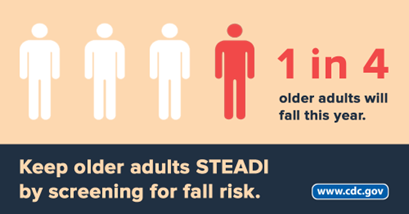Prevention for Older Adults
Prevention in Older Adults
People who are 75 years and older have the highest numbers of TBI related hospitalizations and deaths. Falls are the most common mechanism for TBI in the elderly, followed by motor vehicle accidents.
Traumatic brain injuries can have devastating effects but can be prevented, so you can stay healthy and independent longer.
Make your home safer
- Remove rugs or use double sided tape to keep the rugs from slipping.
- Remove items from floors and stairs that may cause tripping.
- Place often used items within easy reach, so that a step stool is not needed.
- Install grab bars next to the toilet and in your tub or shower.
- Place non-stick mats in your bathtub and shower floors.
- Add brighter lighting and reduce glare with lampshades.
- Be sure there is good light and handrails on staircases.
- Wear good-fitting shoes with non-slip soles. *Avoid wearing slippers and socks when walking.
Useful Tools
Every 21 Seconds Documentary
Every 21 Seconds is inspired by a true story of a traumatic brain injury survivor (Brian Sweeny). This film explores how the brain injury affects his relationships and his family life. With the support of his family and friends, he gains strength to recover and rebuild a life after sustaining a brain injury.
You can watch the full documentary here or complete the request form for a DVD.
Exercise
- Walking
- Weight shifting
- One-legged balancing
- Leg raises
- Foot taps
- Head rotations
- Standing marches
- Sit-to-stands
- Tai Chi

Visit the STEADI site to learn more about CDC’s initiative to help reduce fall risk among older adults.
Nutrition and Hydration
- Enjoy a variety of foods from each food group to help reduce the risk of developing chronic diseases such as high blood pressure, diabetes, hypertension, and heart disease.
- Choose foods with little to no added sugar, saturated fats, and sodium.
- Get enough protein during your day to maintain muscle mass.
- Focus on the nutrients you need, including potassium, calcium, vitamin D, dietary fiber, and vitamin B12.
- Keep water easily accessible
- Incorporate other beverages
- Eat your water: Many foods are a great source of water
- If you are in hot weather, drink more
- If you are active, drink more
Know the Effects of your Medications
- Ask your doctor or pharmacist to look at all your prescription and non-prescription medications. As people age, the way medicines work in the body can change.
- Older adults taking blood thinners should be seen by a healthcare provider if they have a bump or blow to the head, even if they do not have any symptoms.
See Your Healthcare Providers Regularly
- Make sure an eye doctor checks to be sure eyeglasses are correct and that there are no conditions that limit vision.
- Use any assistive devices prescribed by your doctor.
